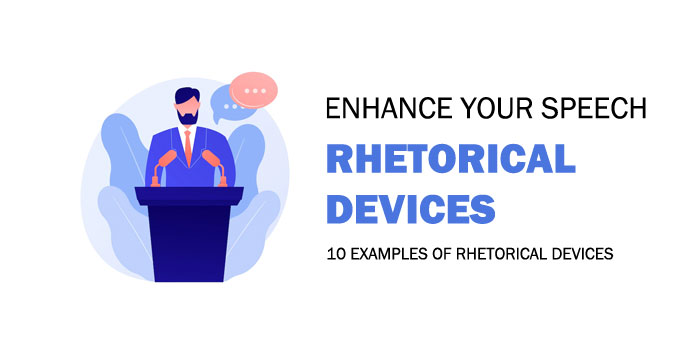10 Rhetorical Devices to Enhance Your Speeches
Why do you need rhetorical devices in speeches? Using rhetorical devices brings life to your speeches. It engages your audience and adds special effects to your talk.
People are less likely to remember a bland, straightforward speech in years to come. Powerful speeches like Martin Luther King Jr’s famous “I have a dream” are timeless. Apart from having a remarkable delivery, this speech also contains many rhetorical devices.
So here are a few rhetorical devices in speeches you should know about. Practicing and applying them will take your oratory skills to new heights.
10 Rhetorical Devices to Enhance Your Speech
1. Analogy
An analogy is a rhetorical device that helps describe the relationship between one thing and another.
Speakers often use analogies to help their audience understand something better. For example, “The sky resembles a huge bowl of clear water” can help people visualize a clear sky.
When you use an analogy to compare two things, your goal should not just be to show similarity. Rather, it should illustrate a point about reality. You can use analogies to explain your thoughts and express your ideas more clearly.
Examples of Analogy
- “It has been well said that an author who expects results from a first novel is in a position similar to that of a man who drops a rose petal down the Grand Canyon of Arizona and listens for the echo.” (P.G. Wodehouse)
- “People are like stained-glass windows. They sparkle and shine when the sun is out, but when the darkness sets in, their true beauty is revealed only if there is a light from within.” (Elisabeth Kubler-Ross)
2. Anaphora
Anaphora is one of the rhetorical devices in speeches that have proven effective for excellent speakers. To use anaphora, you must repeat a particular word or phrase at the beginning of consecutive sentences or phrases.
Anaphora lets a speaker emphasize a given word that drives the ideas they wish to communicate. Additionally, anaphora is not only a great device in speeches but also in poetry and prose.
Examples of Anaphora
- “Go back to Mississippi, go back to Alabama, go back to South Carolina, go back to Georgia, go back to Louisiana, go back to the slums and ghettos of our northern cities, knowing that somehow this situation can and will be changed.” (Martin Luther King Jr.)
- “It was the best of times; it was the worst of times, it was the age of wisdom, it was the age of foolishness, it was the epoch of belief, it was the epoch of incredulity, it was the season of light, it was the season of darkness….” (Charles Dickens)
- “It’s not the size of the dog in the fight; it’s the size of the fight in the dog.” (Mark Twain)
3. Epiphora
Epiphora, unlike anaphora, is a word or phrase repetition at the end of consecutive sentences, clauses, or phrases. Epiphora offers an equal amount of power to your words as anaphora does.
Additionally, you can use this device to emphasize a certain area in your speech and apply it in persuasive writing.
Examples of Epiphora
- “Take whatever idiot they have at the top of whatever agency and give me a better idiot. Give me a caring idiot. Give me a sensitive idiot. Just don’t give me the same idiot.” (Aaron Broussard)
- “She’s safe, just like I promised. She’s all set to marry Norrington, just like she promised. And you get to die for her, just like you promised.” (Jack Sparrow, Pirates of the Caribbean)
- “There is nothing wrong with America that cannot be cured by what is right with America.” (Bill Clinton)
4. Puns
Puns let you play on word meanings, homographs, and homophones to achieve humorous effects. It involves using witty expressions that can lighten up your audience and bring some fun into your speech.
Puns, also known as paronomasia, can help you bring your speech to life. However, you should also pick your puns carefully. A bad pun can elicit undesired effects.
Additionally, your audience should be able to decipher the hidden joke for the pun to be effective.
Examples of Pun
- “Give me a torch: I am not for this ambling; Being but heavy I will bear the light.” (William Shakespeare, Romeo and Juliet)
- “You can tune a guitar, but you can’t tuna fish. Unless, of course, you play bass.” (Douglas Adams)
- “Hanging is too good for a man who makes puns; he should be drawn and quoted.” (Fred Allen)

5. Aphorism
If you want to sound philosophical in your speech, an aphorism is a suitable rhetorical device. You use short, pithy statements that express a general truth or observation to present a moral or philosophical idea.
Aphorism uses metaphor to help the audience relate to the situation you are presenting. While these statements may be general knowledge, aphorisms inspire more profound thoughts in your audience and can take a few seconds to sink in for some of your audience.
Aphorisms are easy to remember because they are short. They also apply to many situations, so you can use them for different speeches.
Examples of Aphorism
- “If you judge a fish by its ability to climb trees, it will spend its whole life thinking it is stupid.” (Albert Einstein)
- “All we have to decide is what to do with the time that is given to us.” (Gandalf, The Lord of the Rings)
- “You can’t always get what you want, but if you try, sometimes you get what you need.” (The Rolling Stones)
6. Metanoia
Metanoia is a method of self-correction when you deliberately return to an earlier part of your speech and correct something you said. This is particularly useful for softening parts of a sentence where one might otherwise appear arrogant or condescending.
On the other hand, you can sound harsher than you were and still get away with the harshness.
Metanoia, also known as an afterthought figure, helps you clarify a point with additional definitions. You can also use it to emphasize an idea through paraphrasing.
Examples of Metanoia
- “To help or, at least, to not harm.” (The Hippocratic Oath)
- “It was Gatsby’s mansion. Or rather, as I did not yet know Mr. Gatsby, it was a mansion inhabited by a gentleman of that name.” (F. Scott Fitzgerald, The Great Gatsby)
- “Shortly after I came to Washington, I was told in a way that showed me it was no loosely thought out—let me correct that statement. I was told in a serious way that Mr. Finletter—or rather, I was told by Mr. Finletter that he had a serious question as to the loyalty of Dr. Oppenheimer.” (David Tressel Griggs)
7. Asyndeton
To use asyndeton, all you need to do is remove the coordinating conjunctions from a sentence.
These include for, and, nor, but, or, yet, and so. Asyndeton helps you maintain concision and keep the focus on essential words in a sentence or phrase.
For example, the famous quote by Julius Caesar is a quick way to understand asyndeton. The saying “I came, I saw, I conquered” could have been “I came, I saw, and I conquered.” The omission of the conjunction ‘and’ makes the saying more concise, straightforward, and powerful.
Examples of Asyndeton
- “We shall go on to the end, we shall fight in France, we shall fight on the seas and oceans, we shall fight with growing confidence and growing strength in the air, we shall defend our Island, whatever the cost may be...” (Winston Churchill)
- “An empty stream, a great silence, an impenetrable forest. The air was thick, warm, heavy, sluggish.” (Joseph Conrad, Heart of Darkness)
- “We shall pay any price, bear any burden, meet any hardship, support any friend, oppose any foe to assure the survival and the success of liberty.” (President John F. Kennedy)
8. Polysyndeton
Polysyndeton is an opposite rhetorical device to asyndeton. Instead of omitting the conjunctions, this device lets you include as many of them as possible.
With polysyndeton, you get to use conjunctions where they are unnecessary. However, your use of conjunctions must still be grammatical.
Polysyndeton generally lets your speech flow with a sense of excitement or urgency. It helps the listener focus on each item in your list. It further enriches your language use without over-flowery embellishment. Additionally, it is common in everyday speech.
Examples of Polysyndeton
- “In years gone by, there were in every community men and women who spoke the language of duty and morality and loyalty and obligation.” (William F. Buckley)
- “Neither snow nor rain nor heat nor gloom of night stays these couriers.” (The U.S. Postal Service Creed)
- “We will always remember them, these skilled professionals, scientists and adventurers, these artists and teachers and family men and women, and we will cherish each of their stories—stories of triumph and bravery, stories of true American heroes.” (President Ronald Reagan)
9. Symploce
Symploce is another rhetorical device that involves repetition. It combines anaphora with epistrophe to create an effect.
In symploce, you repeat certain words or phrases at the beginning and end of successive sentences.
You can use symploce to tell the difference between two or more ideas by changing only a few words in the middle of a given sentence. This small change gives a whole new meaning to your words.
Examples of Symploce
- “The madman is not the man who has lost his reason. The madman is the man who has lost everything except his reason.” (G.K. Chesterton, Orthodoxy)
- “Much of what I say might sound bitter, but it’s the truth. Much of what I say might sound like it’s stirring up trouble, but it’s the truth. Much of what I say might sound like it is hate, but it’s the truth.” (Malcolm X)
- “Let us let our own children know that we will stand against the forces of fear. When there is talk of hatred, let us stand up and talk against it. When there is talk of violence, let us stand up and talk against it.” (William Jefferson Clinton)
10. Anastrophe
Anastrophe, also known as hyperbaton, is an inversion of a sentence’s regular order of words.
Where a sentence traditionally follows the subject-verb-object order, an anastrophe makes it an object-subject-verb structure.
Anastrophe is useful when you intend to emphasize a particular word. Therefore, you bring the word to the beginning of the structure and let other words follow. This rhetorical device is used in George Lucas’s Star Wars series as a peculiar language style for Master Yoda.
Examples of Anastrophe
- “Named must your fear be before banish it you can.” (Yoda)
- “In a hole in the ground there lived a hobbit.” (J.R. Tolkien, Hobbit)
- Hear me, my chiefs! I am tired; my heart is sick and sad. From where the sun now stands, I will fight no more forever. (Chief Joseph, 1877 Surrender)
Conclusion: Rhetorical Devices in Speeches
Speeches can be much better with deliberate efforts. You can make a lasting impression on your audience using proper rhetorical devices.
So, it would be best if you spent some more time and effort to fine-tune your speeches with these rhetorical devices. The results will be worthwhile, and the response from your audience will be rewarding.
You might also like: How to Prepare for a Speech
